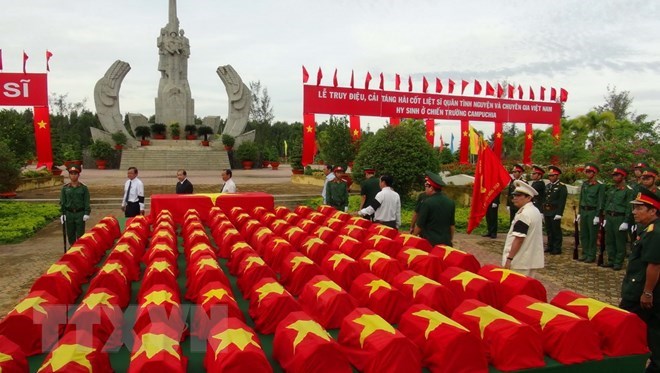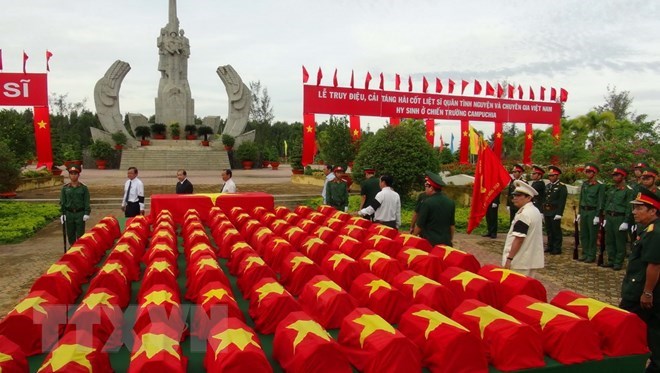
Leading experts and scientists of Vietnam gathered at a symposium in Ho Chi Minh City on April 5 to look into some issues about the war defending the country in the southwestern border.

A ceremony to
rebury the remains of Vietnam's voluntary experts and soldiers who laid down
their lives in the national protection war in the southwestern border
(Photo: VNA)
The event was organised by the Vietnam Association of Historical
Sciences, the University of Social Sciences and Humanities under the Vietnam
National University - HCM City, and the HCM City Association of Historical
Sciences.
In the opening remarks, Chairman of the HCM City Association of Historical
Sciences Prof. Dr Vo Van Sen affirmed that Vietnam’s move came from the
legitimate demand for self-defence. Facing the provocation of the Khmer Rouge
genocidal regime in the southwestern border, Vietnam exercised utmost restraint
and showed the goodwill and the wish for peaceful and friendly cooperation
between the nations.
That Vietnam’s voluntary soldiers came to Cambodia to perform the international
duty was necessary to prevent the recovery of the genocidal regime, which was
confirmed by Cambodian leaders later, he noted.
More than 50 reports sent to the symposium and opinions of experts and
scientists clarified the necessity and inevitability of the war protecting
Vietnam in the southwestern border (1977 – 1979). They made clear that the war
(before January 7, 1979) and Vietnam’s international mission in Cambodia (1979
– 1989) are two different issues which had different historical backgrounds,
causes and developments but were logically connected.
At the event, participants also proved that the war in the southwestern border
was directly linked with the national protection war in the northern border,
and that the fights greatly changed Vietnam’s international relations and
affected the country’s post-war situation.
Assoc. Prof. Dr Tran Ngoc Long, former Deputy Director of the Military History
Institute of Vietnam, said these historical events should not be considered as
two separate fights but they should be called the "war to protect the
Fatherland in the two ends of the border”.
Many other participants said the national protection war in the southwestern
border happened as fast as a self-defending counter-attack of the Vietnamese
armed forces.
Assoc. Prof. Dr Ha Minh Hong from the University of Social Sciences and
Humanities said it was a just war and obtained many successes of national and
international significance, including defeating the war machine of the Khmer
Rouge, annihilating the genocidal regime, firmly protecting the country’s
border, and helping Cambodia to revive its revolution.
The workshop also analysed many aspects regarding the background, causes and
developments of the national protection war, the art of military and diplomacy
of Vietnam, and lessons from the fight.
Source: VNA
In the spirit of "Party members go first, the people follow”, all households of Party members in the Doan Ket sub-region in Da Bac town, Da Bac district, voluntarily removed gates and fences, and donated land when the road expansion project passed through their properties. Inspired by their example, 68 households in the sub-region quickly followed suit, contributing over 1,400 sq.m of residential and perennial cropland to widen the main road through the residential area. The exemplary role of Party members in Doan Ket stands as a shining example of studying and following President Ho Chi Minh’s thought, morality, and lifestyle.
The Hoa Binh provincial People's Committee held a monthly meeting on May 29 to assess the implementation of socio-economic development tasks in the first six months of 2025, the progress of key projects, and some other important issues.
During his lifetime, President Ho Chi Minh always expressed his deep affection and special concern for children and youth. He once emphasized: "Caring for and educating children well is the responsibility of the entire Party and the entire people”; "First of all, the family (i.e. grandparents, parents, siblings) must do this job well”. "the Party Committees…, the Children’s Committee, the Youth Union, the education sector, and all related organizations must have specific plans to ensure children grow healthier and more progressive”. His teachings has been remaining valuable and serving as the guiding principles in the work of protecting, caring for, and educating children. In line with this ideology, Hoa Binh Province has continuously been prioritizing and investing resources in the well-being of children in recent years.
Mr. Nguyen Phi Long, the alternate Member of the Party Central Committee and Secretary of the Provincial Party Committee chaired the meeting of the Standing Committee of the Provincial Party Committee to provide opinions on several investment projects within the province. There was the attendance of Ms. Bui Thi Minh, the Permanent Deputy Secretary of the Provincial Party Committee and Chairwoman of the Provincial People’s Council; Mr. Bui Đuc Hinh, the Deputy Secretary of the Provincial Party Committee and Chairman of the Provincial People’s Committee and other members of the Standing Committee; the leaders from other departments, agencies, and some localities.
The Standing Board of the Vietnam Fatherland Front (VFF) Committee of Hoa Binh province held a meeting on May 28 to honour outstanding village elders, village heads, and reputable individuals from local ethnic minority and religious communities.
In mid-May, the provincial Museum organised an exhibition named "Duoi la co Dang Cong san Viet Nam quang vinh” (Under the flag of the glorious Communist Party of Vietnam). This meaningful activity took place in the joyful atmosphere to celebrate the country's major holidays and the Party congresses at all levels for the 2025-2030 term, towards the 14th National Party Congress.



